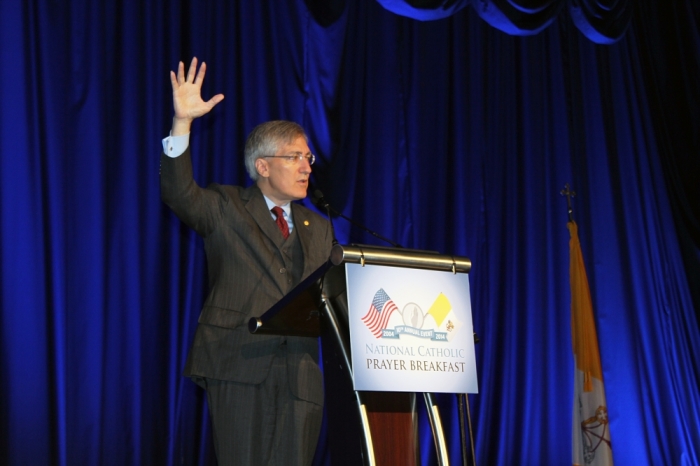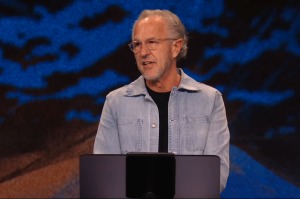With the Days of Comfortable, Acceptable Christianity Now Over, Don't Be Ashamed of the Gospel, Robert P. George Encourages

WASHINGTON — The days of acceptable Christianity in America are over, so in order to be a faithful witness to the gospel, Christians must be willing to suffer the costs of discipleship, Dr. Robert P. George declared in a Tuesday speech.
George, McCormick Professor of Jurisprudence at Princeton University and chair of the U.S. Commission on International Religious Freedom, was delivering the "lay guest speaker" address at the 10th Annual National Catholic Prayer Breakfast in Washington, D.C. While his remarks were directed at his Catholic audience, Christians of other faith traditions may also find them encouraging.
"The days of acceptable Christianity are over. The days of comfortable Catholicism are past. It's no longer easy to be a faithful Christian, a good Catholic, a faithful witness to the truths of the Gospel," George began.
American culture no longer favors faithful Christians, George claimed, noting in particular the derision that comes from being pro-life and pro-traditional marriage. Because of that, Christians must be willing to bear the consequences of standing up for the teachings of Jesus and his bride, the Church.
"They threaten us with consequences if we refuse to call what is good, evil, and what is evil, good. They demand us to conform our thinking to their orthodoxy, or else say nothing at all," he said.
Christians can avoid this derision, George noted, by not believing in, or by staying silent about, the teachings of their faith. It is still socially acceptable to be a "a tame Catholic, a Catholic who is ashamed of the Gospel, or is unwilling, publicly, to act as if he is not ashamed of the Gospel."
George used the metaphor of the week leading up to Christ's resurrection to describe the recent history of Catholics in America. There was another time, he noted, when it was difficult to be a Catholic in America due to the anti-Catholic sentiments shared by many Americans. But as Catholics came to be accepted, they became comfortable. They were like the crowd on Palm Sunday.
"Things were easy in those Palm Sunday days, standing with Jesus and his truths was the 'in thing' to do, to be part of the crowd, waving the palm branches, shouting 'hosanna,'" he said.
But now the situation is more like Good Friday. Instead of praising Jesus, the crowd is now yelling, "crucify him." And Jesus is nailed to the cross.
In times like these, George said, Christians will be faced with difficult choices: will they deny Jesus like Peter did, will they be ashamed and flee like some of the other disciples, or will they stand at the foot of the cross like Mary, the mother of Jesus, and John?
"The question each of us must face is this — am I ashamed of the Gospel? And that question opens to others — am I willing to pay the price that will be demanded if I refuse to be ashamed? Am I willing to give public witness to the massively politically incorrect truths of the gospel?" he said.
There is much pressure these days to be ashamed of the Gospel, George believes.
"To be a witness to the Gospel today is to make oneself a marked man or woman. It is to expose oneself to scorn and reproach. ... To place in jeopardy one's security, one's personal aspirations and ambitions, the peace and tranquility one enjoys, one's standing in polite society. ... One may in consequence of one's public witness, be discriminated against, denied education opportunities and the prestigious credentials they offer, one may lose valuable opportunities of employment or professional advancement, one may be excluded from worldly recognition ... [being faithful to the Gospel] may even cost one treasured friendships, may .. produce discord and alienation from family members."
George rejected the notion that Christians should change their views on abortion and marriage lest they be on the "wrong side of history." Christians are judged by God, not history, he said.
"History ... is an impersonal and contingent sequence of events. Events that are determined in decisive ways by human deliberation, judgment, choice and action," he declared. "The future of marriage and of countless ... vulnerable human lives, can and will be determined by our judgements and our actions, our willingness or unwillingness to bear faithful witness, our acts of courage or cowardness, that's what makes history.
"The idea of a judgment of history is secularism's vain, meaningless, hopeless, pathetic attempt to devise a substitute for what the great Abrahamic traditions of faith know is the final judgment of almighty God, who is not an impersonal force. History is not God. God is God. History is not our judge. God is our Judge."
George ended his speech by reminding his audience what happened after Good Friday. Continuing with his metaphor, George noted that Christians have reason to be hopeful for the future.
"Let us remember that Easter is coming. ... We would much rather be acceptable Christians, comfortable Catholics. But our trust in Jesus, our hope in his resurrection, our faith in the sovereignty of His heavenly Father, can conquer fear. By the grace of almighty God, Easter is indeed coming.
Do not be ashamed of the Gospel. Never be ashamed of the Gospel."
You can read the whole speech here.





























